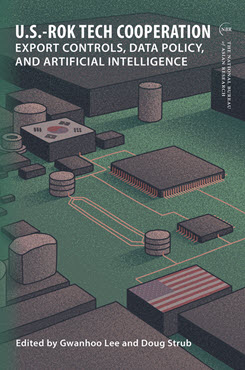Essay in NBR Special Report 107
Pathways for U.S.-ROK Collaboration on Artificial Intelligence
This chapter examines the U.S. and South Korean approaches to the development and governance of artificial intelligence (AI) and proposes pathways to greater cooperation on advancing shared values in AI.
EXECUTIVE SUMMARY
MAIN ARGUMENT
With AI poised to affect both domestic and global economic and security environments, governments around the world have been working to develop policy approaches to balance the opportunities and risks arising from the technology’s increasingly broad utilization. The U.S. and the Republic of Korea (ROK) have both adopted foundational AI policy frameworks, and both countries are well-positioned as advanced technology powers to play leading roles in shaping global AI governance.
In the first section of this chapter, Ahram Moon provides insight into South Korea’s AI industry, highlighting the government’s endeavors to foster innovation and ensure trustworthy AI. She then argues for U.S.-ROK cooperation to effectively tackle AI risks and address challenges stemming from potential overconcentration.
In the second section, Cole McFaul highlights recent policy developments in the U.S. approach to AI governance and examines the state of U.S.-ROK research collaboration. Noting that the U.S. has thus far been cautious to avoid imposing excessive regulations on the AI sector, he emphasizes the need for global cooperation among like-minded countries to find common policy approaches. Given the shared interests and values of the U.S. and South Korea, he concludes that there is a significant opportunity for the two countries to play a leading role in establishing global AI norms and frameworks.
POLICY IMPLICATIONS
- Given the significant risks as well as opportunities arising from AI, it is imperative that in addition to fostering AI development, related policies ensure trustworthy and ethical practices.
- As technology leaders with shared values, it is critical that the U.S. and South Korea work together to develop effective policies that can shape global discourse on AI governance.
- Heightened engagement across all levels of government and civil society will facilitate greater policy alignment among stakeholders in both countries. In addition to government-to-government dialogue mechanisms, efforts should be made to increase business-to-business ties, joint research, and academic exchanges, which will foster closer cross-country cooperation in AI and ultimately facilitate the development of solutions to shared challenges.
Ahram Moon is a Research Fellow at the Korea Information Society Development Institute.
Cole McFaul is a Research Analyst at the Center for Security and Emerging Technology.



